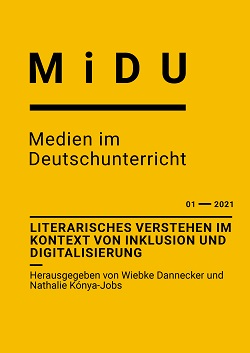Mediale Balladentransformation – Theoretisch-konzeptionelle Fundierung und empirische Rekonstruktion an der Schnittstelle von inklusiver Literatur- und Mediendidaktik
DOI:
https://doi.org/10.18716/ojs/midu/2021.1.4Schlagwörter:
Ballade, Film, Rezeptionsästhetik, Multimodalität, Modellentwicklung, Fachdidaktische EntwicklungsforschungAbstract
Die Ballade gehört zu einer der beliebtesten Gattungen im Literaturunterricht aller Schulformen. Ihre gattungscharakteristische Zwischenposition, aus (gattungs-)konstruierter Sicht, vereint die drei klassischen Großgattungen (Epik, Lyrik und Dramatik). Die handlungs- und produktionsorientierte Transformation von Balladen in andere mediale Erzeugnisse, die sich durch die hybride Zwischenposition und die Oralitäts- und Aufführbarkeitsnähe ergibt, ist indessen in einigen Bundesländern curricular verankert (z.B. Medienkompetenzrahmen NRW). Dennoch gibt es noch keine empirisch fundierten Modelle, die Transformationen im produktionsorientierten Unterricht dimensionieren und die Vielseitigkeit der Gattung für den inklusiven Unterricht betonen. In diesem Beitrag wird daher ein Modell zur Balladentransformation an der Schnittstelle von Literatur- und Filmdidaktik vorgestellt, welches Balladen und filmische Transformation für eine inklusive Balladendidaktik zusammendenkt. Erste Ergebnisse eines damit verbundenen und laufenden empirischen Qualifikationsprojekts, das sich der Erarbeitung eines Modells aus qualitativer Perspektive zuwendet, werden zur Diskussion gestellt.
Abstract (english): Transformations of Ballads into Different Media – The theoretical and conceptional foundation and empirical reconstruction at the interface between inclusive literature and media didactics
The ballad is one of the most popular genres in literature lessons in all types of schools. From a constructional perspective on literary genre, the ballad’s characteristic intermediate position unites the major genres of epic, poetry, and drama. The transformation of ballads, whose performability and hybridity in terms of genre facilitate their adaptability into other media products, appears to be defined in the curriculum in some federal states in Germany (the Medienkompetenzrahmen for handling media literacy in North Rhine-Westphalia, for instance). Nevertheless, there are still no empirically-tested models that support ballad transformations in education and make use of the genre’s versatile potential applications in the inclusive classroom. In this article, a model for ballad transformation at the interface of literature didactics and film didactics, which connect ballads and films, as well as first empirical results of an ongoing doctoral thesis with a qualitative research approach are presented.
Downloads
Veröffentlicht
Versionen
- 08.11.2021 (2)
- 30.09.2021 (1)
Ausgabe
Rubrik
Lizenz
Copyright (c) 2021 MiDU - Medien im Deutschunterricht

Dieses Werk steht unter der Lizenz Creative Commons Namensnennung - Keine Bearbeitungen 4.0 International.







